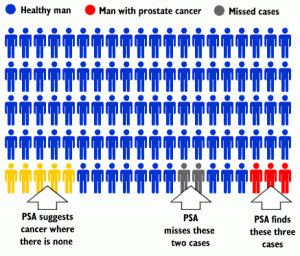 Once again prostate cancer screening has been in the news – fueled by a provocative book written by Dr. RJ Ablin entitled “The Great Prostate Hoax: How Big Medicine Hijacked the PSA Test and Caused a Public Health Disaster”. Dr. Albin’s claims are not easily dismissed as he is the person who discovered PSA in the 1970s. Dr. Albin’s discovery of PSA, and its initial FDA approval, was for the purpose of following men who were seemingly cured of prostate cancer, and to alert doctors that the cancer might be coming back and thus require additional treatment.
Once again prostate cancer screening has been in the news – fueled by a provocative book written by Dr. RJ Ablin entitled “The Great Prostate Hoax: How Big Medicine Hijacked the PSA Test and Caused a Public Health Disaster”. Dr. Albin’s claims are not easily dismissed as he is the person who discovered PSA in the 1970s. Dr. Albin’s discovery of PSA, and its initial FDA approval, was for the purpose of following men who were seemingly cured of prostate cancer, and to alert doctors that the cancer might be coming back and thus require additional treatment.
However, ultimately the test started to be used for the early detection of prostate cancer in men who had no symptoms. Unfortunately, when used for that purpose, the PSA is a very imperfect test. According to Dr. Albin, in a recent interview with Medscape, the test is wrong 80% of the time as a predictor to see if an otherwise healthy appearing man has prostate cancer. This is similar to the situation in ovarian cancer where the CA-125 blood test is used by cancer specialists to follow and treat women who have ovarian cancer; unfortunately it has failed to be an effective test in catching early ovarian cancer.
Dr. Albin highlights some of the issues of using the test for widespread screening: “A man can have a PSA of 0.5 ng/mL and have cancer, or a PSA of 11 ng/mL and not have cancer…..Furthermore prostate cancer is an age-related disease. If you get, for example, 100 men — black or white — between the ages of 60 and 69 years and do biopsies, you will find that 65% of these men have prostate cancer because it’s age-related.”
Importantly the Achilles heel of the test is that it is unable to make the important distinction as to which men have a slow moving cancer that they will outlive and would be best ignored, and which men are destined to have a much more aggressive and ultimately life – threatening cancer.
Dr. Albin argues that, as a result of the misuse of his test, an unstoppable multi-billion dollar industry has developed where men are tested routinely, many are found to have elevated PSA results, countless have prostate biopsies, and many have removal of their prostates with not infrequent side effects such as sexual impotence and loss of urinary control; all at the cost of billions of health care dollars with few if any lives saved to show for it. He calls robotic surgery “a train that is ready to come off the tracks;” and that when the FDA approved robotic surgery for the prostate, its approval was not based on any human studies.
Supporters of routine PSA testing point to a long term European study with a 20% decrease in deaths due to PSA screening. Detractors point to the largest ongoing US study which find few, if any, lives saved.
So where does that leave us presently in 2014?
The PSA test is clearly a far from perfect test for the detection of early prostate cancer. There can be real harms to testing but possibly a small benefit in lives saved. However, the benefits of testing are not as clear as, say, mammography for early breast cancer detection in women, or as noted in my recent post the benefits of universal colonoscopies for the prevention of colon cancer. Unfortunately, when it comes to prostate cancer, there is no better test on the horizon. According to Albin that may in part be due to the fact that we spend over 3 billion dollars a year on PSA screening, but the National Cancer Institute spends just one tenth that on urological research.
